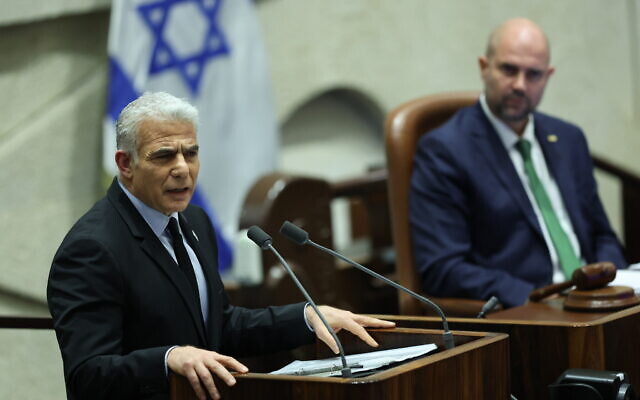Organizers of demonstrations against the government’s planned radical overhaul of the judiciary are urging protesters to rally outside the homes of several senior members of Prime Minister Benjamin Netanyahu’s party, as they look to ramp up their opposition to the proposed shakeup, Israeli television reported Wednesday.
According to Channel 12 news, the protests were called for next week, when coalition lawmakers will begin voting on a bill that lays out the changes.
In a statement, organizers said that demonstrations targeting specific politicians could “tip the balance of the scales” for the protest movement, which has featured weekly mass demonstrations across the country.
“Our goal is to make these members of the Knesset understand that if they vote in favor [of government reforms], they will cause irreparable damage to the State of Israel and the Israeli people,” they said.
The TV report said organizers will initially target Defense Minister Yoav Gallant, Economy Minister Nir Barkat, Agriculture Minister Avi Dichter and Knesset Foreign Affairs and Defense Committee chairman Yuli Edelstein, all of Likud.
Get The Times of Israel's Daily Edition by email and never miss our top stories
Directions to the ministers’ homes were being shared on dedicated WhatsApp chat groups, according to the report.
Organizers stressed it was crucial to demonstrate at times when the lawmakers are home, with the first protests called for next Tuesday.

Settler leaders and residents stage a protest outside the home of then-defense minister Benny Gantz in Rosh Ha’ayin, October 6, 2022. (Meir Elifor)
The holding of demonstrations outside officials’ private homes is a tactic that has been used by all sides of the Israeli political field to protest an assortment of issues. Occasionally, police will prevent the protesters from getting too close to the building.
Also Wednesday, more than 200 legal advisers at various Israeli institutions put their names to a public letter decrying the government’s judicial reform plans and voicing support for Attorney General Gali Baharav-Miara and other legal officials who are pushing back against it.
The letter warned the planned legislation will harm the independence of the judiciary and the public sector which are “the pillars of a democratic society.”
“The government’s steps will have unprecedented repercussions on the State of Israel’s power and cohesion, including regarding economic and global aspects,” the advisers wrote, calling an independent justice system and civil service “the pillars of a healthy democratic society that maintains the principle of separation of powers, equality before the law, and the protection of human and citizen rights in the country.”
They criticized the government for moving too fast with the proposed changes and for not showing “any desire to talk or promote moves within a real public debate.”
The advisers offered to be part of a dialogue with the government, “out of a desire to influence and contribute to the stability of the legal system in Israel, while maintaining and respecting its independence.”

Thousands of protesters rally against Prime Minister Benjamin Netanyahu’s government’s planned judicial overhaul, in Tel Aviv on February 4, 2023. (Gili Yaari /Flash90)
Meanwhile, opposition leader Yair Lapid came out in support of a workers’ strike called for Monday in protest of the government’s judicial overhaul plan.
“On Monday we are all heading to Jerusalem to protect and defend our country,” Lapid said in a video message on social media. “Employers need to allow all workers who want to go to Jerusalem to fight for the country, to fight for our democracy, and to say: ‘No more. We won’t allow you to destroy our democracy.’”
Protest organizers — including former defense minister Moshe Ya’alon — said dozens of organizations, among them companies and civil society groups, have joined the planned strike, which is slated to coincide with a large protest outside the Knesset.
However, the country’s largest labor union, the Histadrut labor federation, opposes the strike and will not participate, with a source telling Channel 12 that “the Histadrut leads, it doesn’t follow.”
Additionally, workers’ committees at the Israel Aerospace Industries and the National Labor Federation in Eretz-Israel, another labor union, do not intend to participate in the strike, according to the report.
The head of the IAA labor union, Yair Katz, who is the son of senior Likud member and Energy Minister Israel Katz, said “irresponsible use of the strike weapon is a fatal blow to society and harms organized labor.”
Labor Federation in Eretz-Israel chair Yoav Simhi panned the calls for a strike as an attempt to cause serious harm to the economy and warned it would negatively impact the cost of living. Labor actions, he said, are reserved for matters concerning workers’ rights and political use of the method is “not appropriate.”
Last month Lapid met with Histadrut chief Arnon Bar-David to discuss the potential of a wide labor strike in protest of the current government, Channel 13 reported at the time.

Opposition leader Yair Lapid speaks in the Knesset in Jerusalem, on February 6, 2023.(Yonatan Sindel/Flash90)
Though the Histadrut has not yet taken a stance on the government’s reforms, it has issued a warning that it will push back against a bill proposed by far-right MK Simcha Rothman aimed at restricting the right of union members to launch labor strikes.
Rothman’s bill, submitted last month, specifically targets the right to strike for essential workers in the national electricity, water, ports, public transportation and health fields, along with the Israeli Stock Exchange and the Bank of Israel.
Bar-David issued a statement at the time asserting that the bill would not pass.
Earlier Wednesday, hundreds of Israeli military reservists and veterans began a three-day march from Latrun to the Supreme Court in Jerusalem to protest the government plans.
The plan has drawn intense criticism and warnings from leading financial and legal experts, as well as weekly protests and public petitions by various officials, professionals, and private companies.
Critics say that along with other planned legislation, the sweeping reforms will impact Israel’s democratic character by upsetting its system of checks and balances, granting almost all power to the executive branch and leaving individual rights unprotected and minorities undefended.
Netanyahu has pushed back against the criticism, saying that the proposals would strengthen rather than weaken democracy and that his government was carrying out the will of the people.


